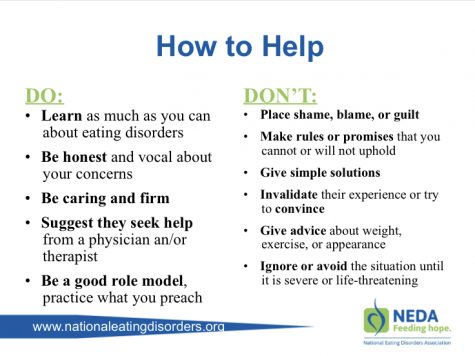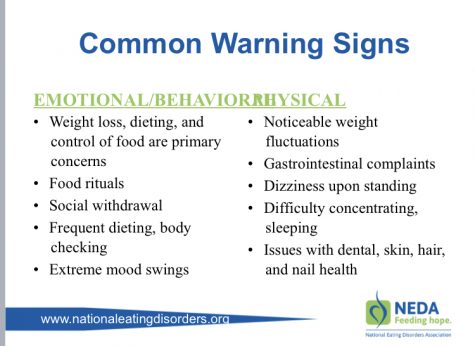Fighting the stigma of eating disorders
February 28, 2021
Social withdrawal, gastrointestinal complaints, and issues with dental, skin, hair, and nail health – these are just some of the signs of a person with an eating disorder.
As part of the Eating Disorder’s Awareness week, vice president of Doctors Without Borders student chapter, Becca Cohen, gave a presentation in collaboration with Active Minds on the truths and stigmas surrounding eating disorders Feb. 24.
Cohen and Active Minds member Kelsey Pacetti presented a PowerPoint created by the National Eating Disorders Association (NEDA), which covered more in depth information about different eating disorders, their causes, and how to treat them.
The presentation made a point to mention stigmas surrounding eating disorders and how they are portrayed in the media and popular culture as only affecting privileged, young white women. However, all genders, races, ethnicities, body shapes and weights, sexual orientations, and socioeconomic statuses are affected by eating disorders. The presentation also emphasized that the bio-psycho-social aspect of the disease is more at the root of the disorder than food, the weight, and not a choice.

“So, I think a big misunderstanding about eating disorders is that it’s always about food, when in reality there are often times, so much more that food related,” said Cohen. “I’m pretty sure that if you would go up to any individual that you know is struggling with an eating disorder if you asked them if it was a choice, I would say nine times out of ten they would say it wasn’t.”
Cohen also mentioned diet culture as being an environmental cause along with weight stigma or weight based discriminations, which is the best known environmental cause of eating disorders.
“We’ve all seen the ads, and the headlines in pretty much every magazine,” said Cohen.
Another stigma mentioned in the slides was that eating disorders are always noticeable such as in the case of Anorexia Nervosa and Binge Eating Disorder, however, this is not always the case. Some patients’ conditions can be misconstrued as picky eating.

“Avoidant, Restrictive, Food-Intake Disorder (ARFID) is an eating disorder that can appear as extremely picky eating. Those struggling may demonstrate a lack of interest in food and experience unexplained bodily discomfort. The limited range of “acceptable” foods narrows over time,” according to NEDA.
Despite all the troubling facts presented in the presentation, it was also equally emphasized that treatment and recovery is possible.
Cohen presented her own personal presentation about her struggles with eating disorders. “If anything we shared today even saves one person, it will make it all worth it,” Cohen said.
For a personal eating disorder screening visit https://www.nationaleatingdisorders.org/screening-tool














